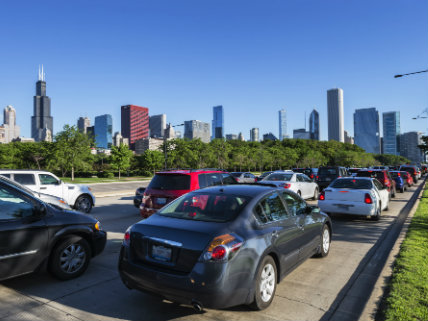Chicago's Proposed Ban of Self-Driving Cars Is Dangerous and Protectionist
Two city aldermen say it's about protecting pedestrians, but it's really about protecting taxi companies.

Cars with drivers killed 46 pedestrians in Chicago last year (and killed more than 4,000 of them nationally) but city aldermen Edward Burke and Anthony Beale say the only way to keep pedestrians safe in the Second City is to ban autonomous cars.
Autonomous, or self-driving, cars are responsible for exactly one death in the United States this year. It wasn't a pedestrian and it wasn't in Chicago.
No matter, though. With Uber now testing four driverless cars on the streets of Pittsburgh, the two alderman want to make it clear that they don't support that sort of innovation in the Second City. The proposed ordinance would include fines of $500 for anyone using an autonomous vehicle.
"No technology is one-hundred percent safe," said Burke, who represents the city's 14th Ward, in a statement.
Indeed, he's right about that. It's fun to imagine what the world might be like if policymakers were to ban every technology that was not 100 percent safe, as Burke seems to believe they should, but it's also immediately apparent that such an idea is ludicrous on its face.
Life is full of risks and nothing is completely safe. A handful of people are killed every year by their own clothing, while about a dozen others are killed by their furniture. Does that mean we should be naked and never have any place to sit? Of course it doesn't.
Burke and Beale point to the lone fatal accident in the short history of self-driving cars as justification for their proposed ban. The death of Joshua Brown, an Ohio man who was killed in May when his self-driving Tesla collided with a tractor-trailer, is a tragedy but the reality is that autonomous cars are many times safer than any motor vehicle being operated by a human being.
The National Highway Safety Administration estimates that 94 percent of automobile accidents in the U.S. are the result of human error. Self-driving cars will make mistakes, and those mistakes might kill some people, but "autonomous vehicles are never drunk, distracted or tired," noted the RAND Corporation in a study released in April. Those factors account for 41 percent, 25 percent and 2.5 percent of all fatal car accidents, respectively, according to RAND.
If Burke and Beale are worried about safety, maybe they should be banning everything except driverless cars.
Of course this isn't really about pedestrian safety. It's really about protectionism.
Burke has a long history of ties to Chicago's taxi industry. His law firm has contracted with Yellow Cab since at least 1997. In 2015, he and Beale teamed up to sponsor a measure that would have imposed hefty new taxes on ridesharing companies like Uber. Burke has also supported requiring ridesharing drivers to obtain chauffer's licenses and get fingerprinted by the city before being allowed to pick-up passengers.
It's also worth nothing that Beale and Burke in 2015 each received $10,000 from the Illinois Transportation Trade Association Political Action Committee, the campaign arm of the taxi industry in Chicago. That might also have something to do with their proposal to ban autonomous cars—a ban that figures to hurt Uber, the taxi company's biggest competition.
Uber, and other ride-sharing services, figure to be the biggest beneficiaries (at least in the short term) of autonomous vehicle technology. The ridesharing giant has made no secret of its desire to use self-driving cars in more places. The current testing in Pittsburgh includes a human engineer in the front seat with the ability to take over control of the car if necessary.
"Indeed, Beale and Burke's ordinance looks like a protective measure—they are protecting the special interests of the taxicab industry, at the cost of ordinary Chicagoans," says Amy Korte, an editor for the Illinois Policy Institute, which tracked the campaign contributions to the two aldermen.
Sadly, this isn't the only time politicians are likely to get in the way of transportation innovation. As Reason's Ron Bailey noted in the July edition of the magazine, the U.S Senate has already held hearings to investigate possible regulations for self-driving cars and at least 53 bills have been introduced in 23 states to do the same.
Efforts to keep autonomous cars off the road will probably end up as historical oddities—like bans on automobiles that took hold in parts of New England and West Virginia during the early 20th Century as reactionaries worried about the safety and pollution caused by the horseess carriages. Compared to the awful safety record of those early cars, the self-driving vehicles of today look even more unassailably safe.
Autonomous cars will make the world a safer place for passengers, pedestrians and other drivers. By claiming they are concerned about pedestrian safety, Burke and Beale are being disingenuous and just plain wrong.
